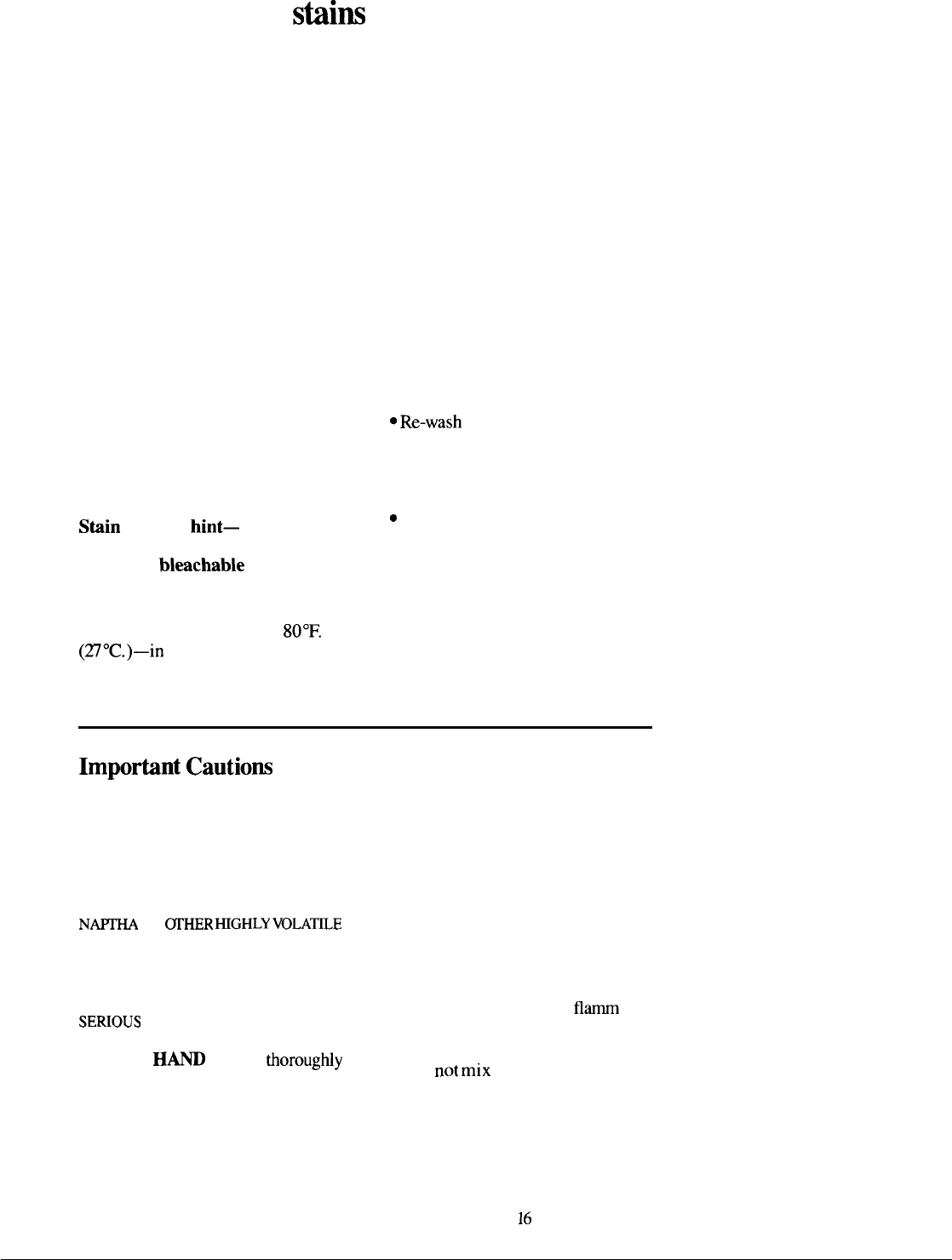
How to remove
stiim
1.
Try to remove stains as soon as
possible. The fresher the stain, the
easier it is to remove.
2. Before attempting to remove
any stain, take these steps:
●
Find the fabric and the finish in
the guide on the next page, and use
only recommended methods.
● Check the care label instructions
that came with the garment.
●
Test stain removal product on a
hidden inside seam or on a sample
of the material.
●
Avoid use of hot water on
unknown stain. It can set some
stains.
3. Follow stain removal with a
thorough rinsing.
4. Wash with recommended
amount of soap or detergent.
Stiin
removal
hint—
Using chlorine bleach for
white and
bleachable fabrics.
Mix 1/4 cup (60 ml) chlorine
bleach with one gallon (3.8 liter) of
cool water—approximately
80°F.
(~°C.)–in
a sink or pan. Soak
stained area for 5 minutes and
launder in washer.
The Case of the “Invisible” Stain.
See next page for
Food or cooking oils on your
Stain Removal Guide.
synthetic garments may cause stains
which are virtually invisible and
which you may not notice as you
put your clothes into the washer.
If these stains are not completely
removed in the wash, the oily spots
may pick up dirt from the wash
water. Then they will become very
visible and you may think they were
caused by the wash cycle itself.
Once these spots become visible,
how can you remove them?
●
Rub in undiluted liquid detergent
and let stand 30 minutes.
Q
Re-wash
using hottest water the
fabric can stand.
How can you prevent these
“After-You-Wash” stains?
c
Increase the amount of detergent
normally
used.
● Increase water temperature where
fabric will permit.
●
Wash synthetic garments more
often.
Importint
Cautiom
. N EVER PUT HIGHLY VOLATILE
SUBSTANCES LIKE GASOLINE,
KEROSENE, OR NAPTHA INTO A
WASHER OR DRYER.
N EVER PUT WASHABLE ARTICLES
THAT HAVE GASOLINE, KEROSENE,
N~
OR
~HER
WGHLY
VOLA~E
SUBSTANCES ON THEM IN A WASHER
OR DRYER. FAILURE TO COMPLY
WITH THESE WARNINGS COULD
RESULT IN A FIRE, EXPLOSION OR
SEWOUS BODILY INJURY.
All items
with volatile substances on them
should be
H~
washed
thorougtiy
with a detergent so that no trace of
volatile substance remains. The
articles can then be machine washed.
Only after thorough hand washing
and machine washing should the
article be placed in the dryer.
Do not use these substances around
your washer and/or dryer during
operation.
*Because cleaning fluids tend to
be toxic, be sure you are in a well
ventilated room when using them.
No cleaning fluid should be used
unless user is familiar with the
limitations and required cautions
(usually printed on label). Use
extreme caution with flammable
compounds. Under no circumstances
should fabrics containing
flamm
able
materials (waxes, cleaning fluids,
etc. ) be washed in washer.
**Do
not
mix chlorine bleach with
ammonia or acids such as vinegar
and/or rust remover. Mixing can
produce a toxic gas which may
cause death.
16


















